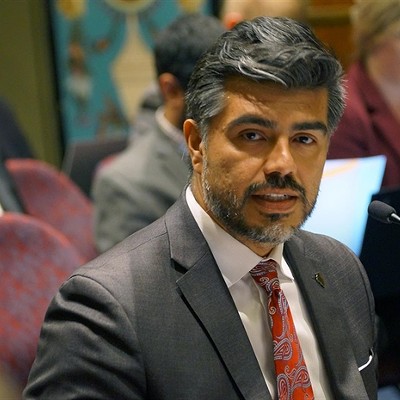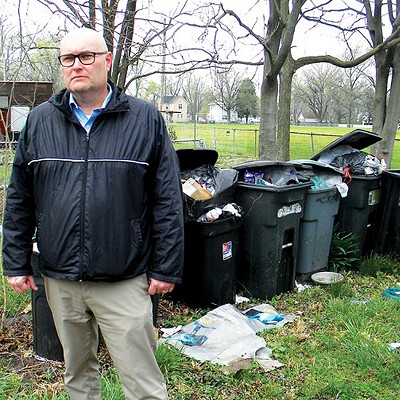Governor-elect Bruce Rauner once remarked to a room full of Republicans that he was “adamantly, adamantly against” raising the minimum wage. Although Rauner later softened his stance, it’s no surprise that Democrats in the Statehouse are pushing minimum wage legislation while they still have a sympathetic governor before Rauner takes office in January.
On Nov. 19, the Illinois Senate Executive Committee approved a bill to raise the state’s minimum wage from $8.25 per hour to $10 per hour for workers over age 18. The wage would increase to $11 per hour by 2017 under the Senate’s plan.
While the bill’s sponsor says she can definitely get it through the Senate, she may hold it if the House doesn’t seem ready to pass it. Outgoing Gov. Pat Quinn is eager to sign the bill into law, but he may not get the chance, leaving Rauner poised to veto it.
The hot-button issue polled extremely well in the Nov. 4 election, with a non-binding advisory question on the ballot passing statewide with 66.5 percent support. In Sangamon County, every Democratic-leaning precinct and most Republican-leaning precincts favored raising the minimum wage. Out of the 147 Republican-leaning precincts in Sangamon County, only 41 precincts offered less than 50 percent support for the question, and even many of those were at 40 percent or higher.
Still, at the Senate committee hearing on Nov. 19, three Republican senators voted against the bill, and two abstained. Sen. Kimberly Lightford, D-Chicago, who sponsors Senate Bill 68, said she’s not surprised that Republicans would pass on such a popular issue.
“It has always been clear that Republicans are driven by business and lobbyists instead of their constituents,” Lightford said.
Speaking during the committee hearing, Senate Republican Leader Christine Radogno credited Lightford with working hard on the legislation and acknowledged the popularity of the issue. However, Radogno expressed concern that a minimum wage hike would lead more businesses to automate their processes and actually eliminate jobs.
“I would like to see us move forward with a program that addresses both minimum wage and some other things that can support our state’s employers in providing additional jobs,” Radogno said.
Lightford says she hopes to call the bill for a vote before the full Senate as soon as the legislature returns for the second half of its annual veto session on Dec. 2. While Lightford says she’s “100 percent sure” she has the votes lined up to pass it in the Senate, she’s unsure whether the House would approve it.
The main stumbling block for the House, she says, is likely to be a provision preventing municipalities from setting a higher local minimum wage. That’s relevant because the City of Chicago is reportedly considering an increase to $13 per hour. Lightford says if that provision is removed from her bill, it would likely pass the House.
If Lightford holds the bill back too long, however, she may also have to contend with an unsympathetic new governor in Bruce Rauner.
At a candidate forum during the Republican gubernatorial primary in Dec. 2013, Rauner was recorded on video saying he opposed raising the minimum wage. The video was used against him in political attack ads by Democratic groups during the general election, and Rauner quickly backtracked. Speaking to reporters on Nov. 20, the newly elected Rauner said he favors raising the minimum wage if it’s part of a business-friendly overhaul of Illinois regulations. Rauner hopes to restructure Illinois’ system of workers’ compensation, implement limits on lawsuit payouts and lower taxes for businesses.
“That combined package will be a great way to get all wages rising, including the minimum wage, and really make more economic prosperity for all families,” Rauner told reporters.
The governor-elect is due to be inaugurated on Jan. 12, 2015.
In contrast, outgoing Gov. Pat Quinn campaigned on raising the minimum wage and publicly urged Lightford to run it as soon as possible.
“Raising the wage is about dignity and decency and building an economy that works for everyone,” Quinn said. “Now is the time to get this important legislation passed through the General Assembly for the hundreds of thousands of minimum wage workers across the Land of Lincoln.”
Lightford says she agrees with Rauner that Illinois should examine ways to make the state more business friendly, but she doesn’t think the minimum wage bill should be tied to changes in the business atmosphere.
“The people have spoken, and the percentages don’t lie,” she said. “People realize the current minimum wage isn’t providing a healthy working environment for Illinois families.”
Contact Patrick Yeagle at [email protected].
Wages on the wire
Minimum wage legislation advances ahead of Rauner’s inauguration
[
{
"name": "Air - MedRect Combo - Inline Content 1",
"component": "11490391",
"insertPoint": "3",
"requiredCountToDisplay": "1",
"parentWrapperClass": "fdn-ads-inline-content-block"
},{
"name": "Air - MedRect Combo - Inline Content 2",
"component": "11490392",
"insertPoint": "7",
"requiredCountToDisplay": "5",
"parentWrapperClass": "fdn-ads-inline-content-block"
},{
"name": "Air - MedRect Combo - Inline Content 3",
"component": "11490393",
"insertPoint": "12",
"requiredCountToDisplay": "9",
"parentWrapperClass": "fdn-ads-inline-content-block"
}
]
Illinois Times has provided readers with independent journalism for almost 50 years, from news and politics to arts and culture.
Your support will help cover the costs of editorial content published each week. Without local news organizations, we would be less informed about the issues that affect our community..
Got something to say?
Send a letter to the editor and we'll publish your feedback in print!















